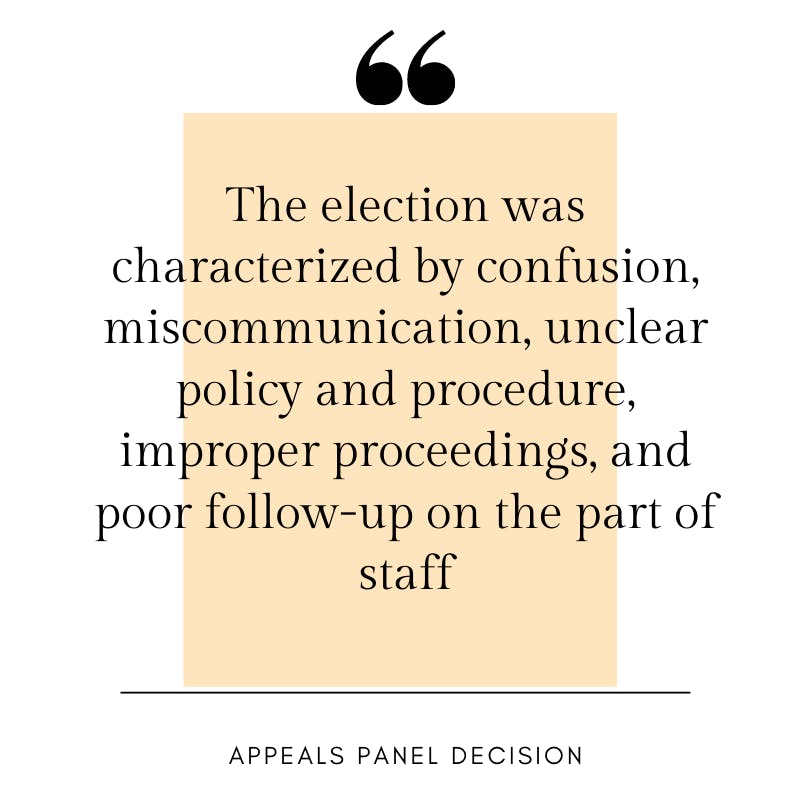Candidates, staff say AS needs to improve while Western awaits resolution of election
This is the fifth in a five-part series about the controversy with the 2020 Western Associated Students elections. Read parts one, two, three and four.

At a June 10 appeals hearing, the disqualifications of 2020 AS executive board-elects Nate Jo, Nora Harren and Nicole Ballard were overturned.
“The election was characterized by confusion, miscommunication, unclear policy and procedure, improper proceedings, and poor follow-up on the part of staff,” the appeals panel wrote in its decision.
The candidates were disqualified, and then reinstated, after they received endorsements from a club that had not held a forum for all candidates to explain their platforms.
The panel found that sharing the endorsements was not a violation, that the grievances were not filed before the final deadline and that Ballard and Harren did not receive proper notice of the grievance and did not have the opportunity to remove a member of the Grievance Board.
But they also found that the Grievance Board did not follow appropriate procedures and processes in its hearings.
AS Communications Director Hunter Stuehm said the election underscored opportunities to update the AS, address ambiguity in the election code and help students understand the procedure of review within the AS.
“This last election cycle, as you could imagine, was especially complex given the circumstances of COVID, and the circumstances of how clubs were engaging their memberships varied so widely,” Stuehm said. “Some clubs were holding synchronous, remote meetings and some weren't.”
Stuehm said the elections coordinator’s role in the AS will be an important area to improve going forward.
“The training and understanding of the role of the AS Elections Coordinator in the election, I think, could be something that's very important,” he said.
On June 13, Nate Jo resigned from their role as acting AS president. Eric Alexander, associate dean of student engagement, said there would be a special election because it was a vacancy, not a disqualification. A month later, the AS executive board made an exception to the rules.
Following AS executive board bylaws, Ballard, now the AS vice president for governmental affairs, assumed the role of acting AS president and will continue in the position until a new AS president is selected, Stuehm said in an email to the Front. He said the special election would have ensured that the student vote decided who took office.
But the AS is not continuing with the special election. Instead, the executive board decided to appoint the next president based on an application process.
On July 10, the AS Executive Board amended its bylaws to allow vacant board positions to be filled over the summer. Ballard appointed a committee to start the process of appointing the 2020-21 AS president. According to a July 12 press release, Ballard hopes to have a new president selected by Aug. 7.
Ford said in an email that he will apply, though he didn't want to or think he should have to.
Both of the spring presidential candidates have called for the end of the Associated Students organization.
Nate Jo, who identifies as a white-presenting Korean-American, narrowly won the election but resigned the same day with an apology for comparing the fraught process to a hypothetical situation — a white supremacist group overtaking the Elections Board and getting a winning Black student’s election overturned. In their resignation, Jo said the AS failed students in the grievance hearings and that it had consistently failed students over the past decade, particularly Black students.
Ford said he specifically called for ending the AS organization if it did not step up by fall quarter.
“I call for the abolition of the AS and everything in it if it continues its ways of anti-Blackness and does not fulfill the demands set forth by our Black students,” he said in an email to the Front.
Ford said people rise in AS by having a large base of support in the organization, and that it’s hard to administer accountability to people who used to be friends. He said that was why many people repeated positions in AS and that many professional staff, as well as Elections Board students, held the same roles in last year’s election as in this year’s.
“If you're a Black student trying to make it in that organization, your time is going to be very short,” he said.
Ford said there was virtually no Black student representation on Executive Board or AS positions in general.
“I cannot just stand by and let students that do not look like me, do not feel like me, do not understand me, dictate what to do with $3 million of student funds,” Ford said.
Stuehm, the AS communications director, said that going forward, the AS will try to make sure all students’ interests are better represented in the elections process.
“The students' trust and confidence as indicated by the vote of students is what gives us our legitimacy to represent the interests of students,” he said.
Jo declined to speak with the Western Front. Harren and Ballard did not respond to requests for comment. A request for comment sent to Eric Alexander was not responded to by Alexander, though the AS Communications Director responded on behalf of multiple AS employees.
This story is the fifth of a five-part series.
Part 1: Uncertainty over endorsements leads to AS election controversy at WWU
Part 2: AS timing rules repeatedly broken
Part 3: AS candidates say connections mattered
Part 4: AS proceedings said to contradict rules and fairness
This has been part 5: Amid controversies, position of AS president up in the air





